|
OutdoorIllinois
VOLUME VIII, NUMBER 9
OUTDOOR ILLINOIS is published monthly by the Department of Natural Resources, Office of Public Services, 524 S. Second St., Springfield, IL 62701-1787, phone (217) 782-7454, e-mail editor@dnrmail.state.il.us.
(Publication number: ISSN 1072-7175)
Periodical Postage Paid at Springfield, IL POSTMASTER: Send address changes to OUTDOOR ILLINOIS, Department of Natural Resources, Dept. NL, 524 S. Second St., Springfield, IL 62701-1787.
George H. Ryan Governor
Brent Manning Director
James D. Garner Deputy Director
Jim Riemer, Jr. Deputy Director
STAFF: James L. Fulgenzi, office director; Gary Thomas, editor; Liz Pensoneau, managing editor; John Alien, staff writer; P.J. Perea, staff writer; Adele Hodde, chief photographer; Chas. J. Dees, staff photographer; Charles J. Copley, design & layout; Cheryl Gwinn, production coordinator; Vera Lynn Smith, circulation.
Illinois Department of Natural Resources
Internet Address: http://dnr.state.il.us
Staff-written material appearing in this publication may be reprinted without permission, provided that OUTDOOR ILLINOIS, Illinois Department of Natural Resources, is acknowledged as the source. OUTDOOR ILLINOIS assumes no responsibility for the return of unsolicited manuscripts or illustrations.
Equal opportunity to participate in programs of the Illinois Department of Natural Resources (IDNR) and those funded by the U.S. Fish and Wildlife Service and other agencies is available to all individuals regardless of race, sex, national origin, disability, age, religion or other non-merit factors. If you believe you have been discriminated against, contact the funding source's civil rights office and/or the Equal Employment Opportunity Officer, DNR, 524 S. Second, Springfield, IL 62701-1787; 217/785-0067; TTY 217/782-9175.
All public meetings conducted by the Department of Natural Resources will be accessible to handicapped individuals in compliance with Executive Order No. 5 and pertinent state and federal laws, upon notification of the anticipated attendance. Handicapped persons planning to attend and needing special accommodations should inform the Department of Natural Resources at least five days prior to the meeting by telephoning or writing the Equal Employment Opportunity Officer, Department of Natural Resources, 524 S. Second St., Springfield, IL 62701-1787, phone (217) 785-0067.
Department of Natural Resources information is available to the hearing impaired by calling DNR's Telecommunications Device for the Deaf (217) 782-9175.

Printed by the Authority of the State of Illinois PRT3216173-28,395-7/01 Illinois Department of Natural Resources Printed on recycled and recyclable paper with soy-based ink.

Illinois Department of
Natural Resources
|
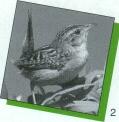 2 Preserving the Prairie
2 Preserving the Prairie
After surviving cows and plows for more than 160 years, the fate of Nachusa Grasslands came down to just 15 minutes.
7 Memories
A stand of pine trees is how guest writer Chris West measures her memories.
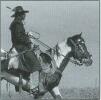 9 Riding the Range
9 Riding the Range
It's been a long, slow journey, but J. Samuel Burton is finally fulfilling a childhood promise.
10 Take a Hike
There's no need to travel to Colorado to hear the sound of water
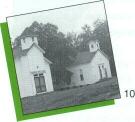 rushing through a rocky stream or to be surrounded by majestic cliffs. Just visit Dixon Springs State Park.
rushing through a rocky stream or to be surrounded by majestic cliffs. Just visit Dixon Springs State Park.
15 An "Extreme" Sport
Muskie fishing isn't for every one; most anglers say you have to be a fishing fanatic to really enjoy this sport.
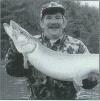 20 NewsFront
20 NewsFront
DNR's Catchable Trout program begins, new fisheries rules, the Outdoor Illinois quiz, pheasant fund projects and predictions of a summer drought top this month's news items.
On the cover...
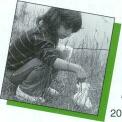
A blooming redbud at Dixon Springs State Park announces the arrival of spring in this DNR file photo.
|
April 2000
I want to take this opportunity to urge constituents of the Department of Natural Resources to participate in the 2000 Census. Important funding hinges upon it.
Although you may not realize it, the state's many hunters, anglers, hikers, bicyclists, birders and outdoor enthusiasts will be impacted because Illinois' census results play a key role in determining our state's share of federal funding.

Illinois currently receives $3,000 per person in federal funds. Even if Illinois is undercounted by just one percent Ś 120,000 peopleŚwe would lose a minimum of $360 million in federal funds over the next 10 years.
The Department of Natural Resources participates in numerous federal programs, including wildlife and sport fish restoration, recreational trails, state and community highway safety, forestry assistance, underground water source protection, boating safety and abandoned mine land reclamation, just to name a few. We can't afford to lose either the funding or the important benefits we reap from these valuable programs.
The state's population is used to calculate Illinois' share of federal
excise taxes that are collected on archery and other sporting equipment under the Wildlife Restoration Act. In federal fiscal year '99, the DNR received more than $807,000 from this program. If Illinois is undercounted during the current census, we could lose a proportional amount of that money.
Accurate tracking of where people reside in Illinois, as well as the size of the communities in which they live, also is important. Population numbers help us prioritize programs and the needs of local communities. When making decisions about preserving open spaces, offering additional recreational opportunities for the public, planning for diverse projects such as new biking and hiking trails, marinas, fish stocking programs or even flood-control projects, the population and its distribution throughout the state are key factors.
Some of the competitive grants awarded by DNR are calculated in part based on population figures. For example, when a community applies for an Open Space Land Acquisition and Development (OSLAD) grant to acquire or develop park land, part of the decision-making process includes the amount of existing open space and
recreational facilities available to their residents, compared to statewide averages. You may be interested to know that the statewide average for community public park land in Illinois is 10 acres for every 1,000 people.
The Census also assists us in determining what areas have the greatest need for state assistance. Additional points are granted to applications from distressed communities that might otherwise not qualify for a grant.
The Department's mission is to work with the people to protect and manage Illinois' resources and to ensure a high quality of life for present and future generations. No segment of our population should be deprived of opportunities just because some of our population has gone uncounted.
So, whether we're awarding grants, deciding where to acquire land for new state park or competing for our fair share of federal funds, the census plays a critical role in helping us with the management of our land and water resources, protection of our fish and wildlife, preservation of the environment and in providing for a better quality of life through outdoor recreation.
Again, I urge everyone to take the time to participate in this year's census. Your cooperation can and will make a difference.

OutdoorIllinois
|

